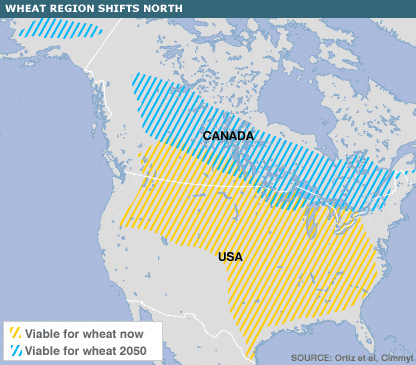Reduction in wheat production by 2050 in North America
New forecasts say climate change will reduce South Asia’s wheat-producing area by 50 per cent. The Consultative Group on International Agricultural Research (CGIAR) urges accelerated development of new strains of maize, wheat, rice and sorghum. CGIAR links 15 non-profit research institutes around the world working mainly on agriculture in developing countries and the tropics.
“We’re talking about the return to large-scale famines in developing countries,” Louis Verchot of the World Agroforestry Centre in Kenya, a member of CGIAR, told the BBC News website. “We’re talking about challenges that have to be dealt with at every level, from ideas about social justice to the technology of food production. We’re talking about large scale human migration and the return to large-scale famines in developing countries, something which we decided 40 or 50 years ago was unacceptable and did something about.”
At CGLAR‘s annual meeting in Washington, scientists will also report on measures to reduce greenhouse gas emissions from farmland.
The most significant impact of climate change on agriculture is probably changes in rainfall, the group said, with some regions forecast to receive more rain, others less; above all, it will become more variable. Water supply to farms will also become more variable in future. Increasing temperatures also affect crops, the group said. Photosynthesis slows as the thermometer rises, which in turn slows plant growth and capacity to reproduce.
Research published two years ago shows rice yields are declining by 10% for every degree Celsius increase in night-time temperature.
“The livelihoods of billions of people in developing countries, particularly those in the tropics, will be severely challenged as crop yields decline due to shorter growing seasons,” said Robert Zeigler, Director General of the International Rice Research Institute, a CGIAR affiliate.
Conversely, rising temperatures will open up areas of the world which are currently too cold for crop cultivation, in regions such as Siberia and northern North America, and wheat will become viable in parts of Alaska. CGIAR figures suggest, however, that extra yield from these regions will not fill the shortfall in the tropics. Furthermore, there are questions of how poorer tropical countries will afford to buy food from richer temperate states.
It’s interesting to ponder the CGLAR findings in light of recent remarks by skeptic Tim Ball suggesting climate change will benefit Canada with lower heating costs, ice-free Arctic shipping and reduced construction costs. Ball is in league with the Hudson Institute, which says shrinkage and disappearance of glaciers is due to increasing intensity of the sun.
Both, however, are at odds with the 2001 report of the Intergovernmental Panel on Climate Change, which said mankind is responsible for global warming through burning coal and oil rather than changes brought by the sun or other natural factors. Also, more than 2,000 scientists from 100 countries determined long ago that greenhouse warming had overwhelmed the warming from solar variations.
As chair of the IPCC has said, humanity has about a decade to make very deep cuts in its carbon fuel use “if humanity is to survive.” Or, as famed British Ecologist James Lovelock declared recently, we may have already passed “a point of no return” in terms of staving off climate chaos.
Subscribe to our newsletter
Stay up to date with DeSmog news and alerts






